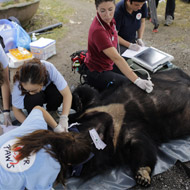
Four Paws back government campaign to end bear farming
Two ‘bile bears’ that spent their lives suffering on a farm in Vietnam have been rescued by animal welfare organisation Four Paws.
The Asiatic black bears, named May and Binh Yen, were set free from their tiny metal cages in Ninh Binh and taken to a Four Paws bear sanctuary. With their rescue, the organisation was effectively able to bring an end to the keeping of so-called ‘bile bears’ in the entire province.
May and Binh Yen are in quarantine and will receive veterinary care from Four Paws vets and caretakers. The organisation says that a lifetime of abuse has left a significant mark on both bears.
“The ultrasound showed Binh Yen’s gallbladder and liver have changed significantly,” said veterinary surgeon Dr Johanna Painer who assisted with the rescue. “A scar at the entrance of the gallbladder clearly indicates that bile was extracted from the bear. Sadly, her condition is critical.”
Bile from farmed bears is used in traditional Chinese medicine as a remedy for eye infections, indigestion and bruises. Despite there being a multitude of alternatives available, bear bile is still highly sought after in many Asian countries.
In Vietnam, the possession and sale of bear bile has been banned since 2005. But over 930 bears are still suffering on bear farms, as humans continue to illegally extract their bile using cruel methods.
May and Bin Yen were the last remaining ‘bile bears’ in the Ninh Binh province. Over the coming weeks, they will receive intensive medical care from the Four Paws team before moving into a newly built outdoor enclosure.
In 2017, the Vietnamese government issued a statement on their intent to bring an end to bear farming and begin rescuing bears. Four Paws is supporting the efforts and has launched a petition to encourage the government to do all that it can to put an end to bear farming.
To date, the petition has received more than 750,000 signatures. To find out more about the campaign and to lend your support, visit www.saddestbears.com/Vietnam
Image (C) Four Paws.



 The latest
The latest